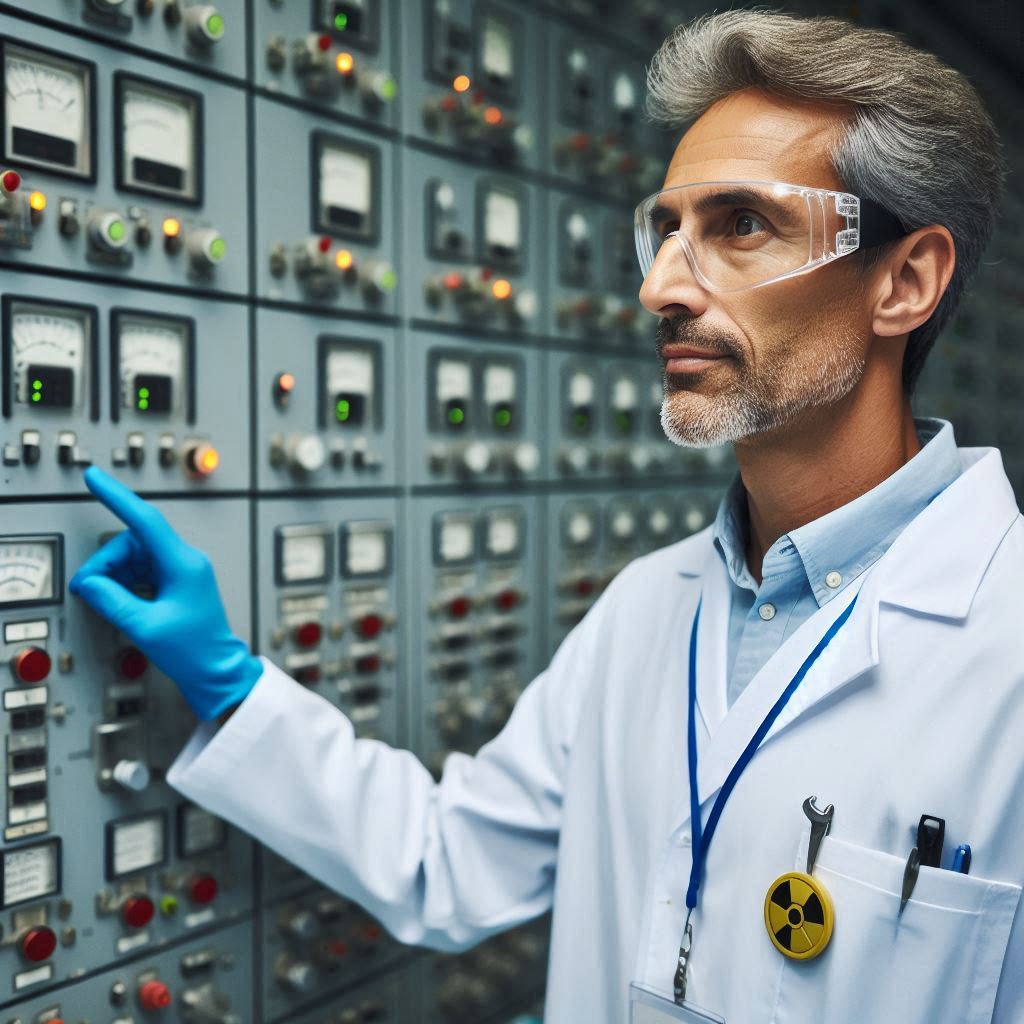Introduction
Professional development is essential for nuclear engineers to stay current and advance their careers.
The field of nuclear engineering evolves rapidly with technological advancements and regulatory changes.
Continuous learning ensures that engineers remain knowledgeable and effective in their roles.
Professional development involves ongoing education and skill enhancement.
For nuclear engineers, this means acquiring new technical skills, staying updated with industry trends, and understanding emerging technologies.
It includes attending workshops, earning certifications, and engaging in specialized training.
In the context of nuclear engineering, professional development also addresses safety protocols, regulatory compliance, and innovative practices.
The nuclear industry demands high standards for safety and efficiency.
Engineers must continually refine their expertise to meet these rigorous standards.
The purpose of this blog post is to highlight the importance of professional development in nuclear engineering.
We will explore various avenues for skill enhancement and career growth.
Additionally, we will discuss how continuous learning can help engineers navigate industry challenges and capitalize on emerging opportunities.
By focusing on professional development, nuclear engineers can ensure their skills remain relevant and their knowledge up-to-date.
This proactive approach not only supports personal career growth but also contributes to the advancement of the nuclear industry as a whole.
Importance of Continuous Learning for Nuclear Engineers
Explanation of How the Field of Nuclear Engineering Is Constantly Evolving
The field of nuclear engineering is always advancing.
New technologies and regulations emerge frequently.
Innovations in reactor design, safety protocols, and waste management reshape the industry.
Engineers must adapt to these changes to remain relevant and effective.
The Need for Nuclear Engineers to Stay Updated with the Latest Technological Advancements
Staying updated with technological advancements is essential for nuclear engineers.
As new tools and methods become available, they offer more efficient and safer ways to operate reactors.
Engineers must engage in continuous learning to keep up with these advancements.
This helps them implement the latest technologies and maintain industry standards.
How Continuous Learning Can Positively Impact a Nuclear Engineer’s Career
Continuous learning significantly impacts a nuclear engineer’s career.
Engineers who stay updated with industry trends can take on advanced roles and projects.
They become valuable assets to their employers and can drive innovation within their teams.
Ongoing education opens doors to new opportunities and professional growth, enhancing job satisfaction and career advancement.
Read: The Role of Aerospace Engineers in Satellite Development
Strategies for Professional Growth in Nuclear Engineering
Overview of Ways to Enhance Skills
Nuclear engineers can enhance their skills through various methods.
Regularly updating their knowledge about emerging technologies and industry trends is crucial.
Engineers should engage in hands-on experiences, such as simulations and laboratory work, to apply theoretical knowledge practically.
Professional Development Opportunities
Conferences and workshops provide excellent learning opportunities.
Attending industry conferences allows engineers to stay informed about the latest research and advancements.
Workshops offer hands-on training in specific techniques and technologies relevant to nuclear engineering.
Online courses are another valuable resource.
Many platforms offer courses tailored to nuclear engineering, covering topics from reactor safety to advanced computational methods.
These courses provide flexibility and allow engineers to learn at their own pace.
Creating a Personalized Professional Development Plan
To create an effective professional development plan, start by identifying areas for improvement.
Assess your current skills and knowledge gaps.
Set clear, achievable goals for skill enhancement and career advancement.
Choose professional development activities that align with your goals.
Prioritize courses, certifications, and events that offer the most value.
Schedule regular check-ins to review your progress and adjust your plan as needed.
By continuously developing technical skills and engaging in professional development, nuclear engineers can remain at the forefront of their field.
Read: Aerospace Engineering in Commercial Spaceflight
Networking in the Nuclear Engineering Industry
Importance of Building a Strong Professional Network
Building a strong professional network is crucial in nuclear engineering.
Networking connects engineers with industry professionals and experts, providing valuable insights and opportunities.
Guidelines on Connecting with Industry Professionals
To build a robust network, attend industry conferences and seminars.
These events offer opportunities to meet key figures and learn about emerging trends.
Join professional associations, such as the American Nuclear Society, and participate in their activities.
Engaging in online forums and social media platforms like LinkedIn can also help in connecting with professionals.
Benefits of Networking for Career Advancement
Networking facilitates career advancement by opening doors to job opportunities and collaborations.
It also provides access to mentorship, which can guide career growth and professional development.
A strong network can lead to new projects, research opportunities, and industry recognition.
Therefore, technical skills and professional networking are crucial for success in nuclear engineering.
By continuously improving their skills and actively engaging with industry professionals, engineers can advance their careers and contribute significantly to the field.
Read: Essential Aerospace Engineering Textbooks

Developing Technical Skills for Nuclear Engineers
The Specific Technical Skills Required for Success in Nuclear Engineering
Nuclear engineers must master several key technical skills for success.
A deep understanding of nuclear physics is crucial for designing and operating reactors.
This knowledge covers principles like fission, neutron behavior, and radiation shielding.
Engineers must also excel in thermodynamics and fluid mechanics to manage heat transfer and fluid flow within reactors.
Reactor design expertise is another essential skill.
Engineers need to be proficient in reactor core design, neutron transport, and fuel cycle analysis.
Familiarity with materials science is also important for selecting appropriate materials that can withstand extreme conditions.
Additionally, knowledge in radiation protection and safety protocols ensures safe reactor operation and compliance with regulations.
Suggestions on How Nuclear Engineers Can Improve and Strengthen Their Technical Skills
To enhance these technical skills, nuclear engineers should pursue continuous education and hands-on experience.
Enrolling in advanced courses related to nuclear engineering can deepen understanding and keep skills current.
Participating in workshops and seminars provides opportunities to learn about the latest advancements in reactor technology and safety measures.
Hands-on experience is invaluable.
Engineers should seek internships or co-op positions in nuclear facilities to gain practical knowledge.
Working on real-world projects helps in applying theoretical knowledge and solving practical problems.
Collaboration with experienced professionals and joining engineering societies can also provide valuable insights and mentorship.
Examples of Technical Certifications and Training Programs Available for Nuclear Engineers
Several certifications and training programs can help nuclear engineers strengthen their technical skills.
The Nuclear Regulatory Commission (NRC) offers certifications that validate expertise in reactor operations and safety.
The American Nuclear Society (ANS) provides professional certifications in various areas, including nuclear criticality safety and radiation protection.
Training programs from institutions like the Oak Ridge National Laboratory and the International Atomic Energy Agency (IAEA) offer specialized courses in reactor physics, nuclear materials, and safety management.
Online platforms like Coursera and edX also provide courses on nuclear engineering fundamentals and advanced topics, allowing for flexible learning opportunities.
Read: Biomedical Engineer: Working in Healthcare Tech
Soft Skills Development for Nuclear Engineers
Importance of Soft Skills for Nuclear Engineers
- Soft skills such as communication, leadership, and problem-solving are essential for nuclear engineers.
- Effective communication ensures clear conveyance of ideas and instructions, reducing errors in nuclear operations.
- Strong leadership skills enable nuclear engineers to lead teams effectively and make sound decisions in high-pressure situations.
- Problem-solving skills are crucial in troubleshooting complex issues that may arise during nuclear plant operations.
Tips for Developing Soft Skills
- Engage in public speaking courses to improve communication skills and confidence.
- Participate in leadership training programs to enhance leadership qualities and decision-making abilities.
- Seek opportunities to work on cross-functional teams to develop problem-solving skills in diverse scenarios.
- Practice active listening to understand the perspectives of colleagues and stakeholders in nuclear projects.
Contribution of Soft Skills to Career Success
- Effective communication fosters collaboration with colleagues and stakeholders, leading to successful project outcomes.
- Strong leadership skills enable nuclear engineers to take on higher-level roles and responsibilities within their organizations.
- Problem-solving abilities help in addressing challenges efficiently, showcasing expertise in critical situations.
Delve into the Subject: Chemical Engineering and Sustainability Initiatives
Balancing Work and Professional Development
Strategies for nuclear engineers to effectively balance their professional development activities with their work responsibilities
- As a nuclear engineer, balancing work and professional development is crucial for career advancement.
- Strategies include dedicating specific time for professional growth activities outside of work hours.
- Setting boundaries with work to ensure time is allocated for attending workshops, seminars, and training programs.
- Effective time management is key to ensuring that both work responsibilities and professional development activities are given adequate attention.
- Creating a detailed schedule that includes time for tasks related to career growth can help in managing time effectively.
Tips for Maximizing Professional Growth Opportunities
- Prioritize tasks based on their importance and urgency to ensure that essential activities are completed first.
- Delegate tasks that can be handled by others to free up time for professional development activities.
- Avoid multitasking during work hours to maintain focus on tasks at hand and avoid distractions.
- Use tools like calendar apps or task management software to stay organized and track progress on professional goals.
- Take breaks during the workday to recharge and maintain productivity levels for both work and development activities.
The Importance of Setting Goals and Tracking Progress
- Setting specific, measurable goals for professional development helps in staying motivated and focused on growth.
- Tracking progress regularly allows for adjustments in strategies to ensure that goals are met effectively.
- Reflecting on achievements and challenges in professional development activities can provide valuable insight for future planning.
- Seeking feedback from mentors or colleagues can help in identifying areas for improvement and growth opportunities.
- Celebrating milestones and accomplishments in professional development can boost morale and motivation to continue growing.
Uncover the Details: How to Stay Updated in the Network Engineering Field
Mentoring and Coaching in Nuclear Engineering
Overview of the benefits of having a mentor or coach in the field of nuclear engineering
- Mentoring and coaching can provide valuable industry insights and guidance.
- Mentors and coaches can help navigate the complexities of the nuclear engineering profession.
- Having a mentor or coach can enhance networking opportunities within the nuclear engineering community.
- Mentoring and coaching facilitate professional growth and skill development.
Tips on finding a suitable mentor or coach for career guidance and support
- Look for mentors or coaches who have a strong background in nuclear engineering.
- Seek individuals who have experience and success in the specific area you want to develop.
- Consider reaching out to professional organizations for mentorship programs or recommendations.
- Establish clear goals and expectations for the mentoring or coaching relationship.
How mentoring and coaching can accelerate professional development for nuclear engineers
- Mentoring and coaching provide personalized guidance tailored to career goals.
- Feedback from mentors or coaches can help identify areas for improvement and growth.
- Mentoring relationships can offer opportunities for practical advice and real-world insights.
- Coaches can provide accountability and support for achieving professional milestones.
- Mentorship and coaching can boost confidence and motivation in career advancement.
Find Out More: Common Challenges Faced by Robotics Engineers
Transform Your Career Today
Unlock a personalized career strategy that drives real results. Get tailored advice and a roadmap designed just for you.
Start NowConclusion
Professional development for nuclear engineers is crucial for staying relevant in the ever-evolving field.
It is essential to invest time and effort in continuous learning and skill enhancement to excel in this challenging industry.
By summarizing key points discussed in this blog post, we emphasize the importance of ongoing personal and professional growth.
We urge nuclear engineers to prioritize their professional development, seeking out opportunities for training, networking, and career advancement.
It is a call to action for every nuclear engineer to take charge of their own success by actively engaging in professional development activities.
Remember, investing in your growth and development not only benefits you as an individual but also strengthens the nuclear engineering community as a whole.
As you navigate your career in this specialized field, embrace a mindset of lifelong learning and continuous improvement.
Together, let’s strive for excellence, innovation, and growth in the field of nuclear engineering through dedicated professional development efforts.
[E-Books for Sale]
The Big Book of 500 High-Paying Jobs in America: Unlock Your Earning Potential
$19.99 • 500 High-Paying Jobs • 330 pages
Explore 500 high-paying jobs in America and learn how to boost your career, earn more, and achieve success!
See All 500 High-Paying Jobs of this E-Book
1001 Professions Without a Degree: High-Paying American Jobs You Can Start Now
$19.99 • 1001 Professions Without a Degree • 174 pages
Discover 1001 high-paying jobs without a degree! Unlock career tips, skills, and success strategies for just $19.99!




